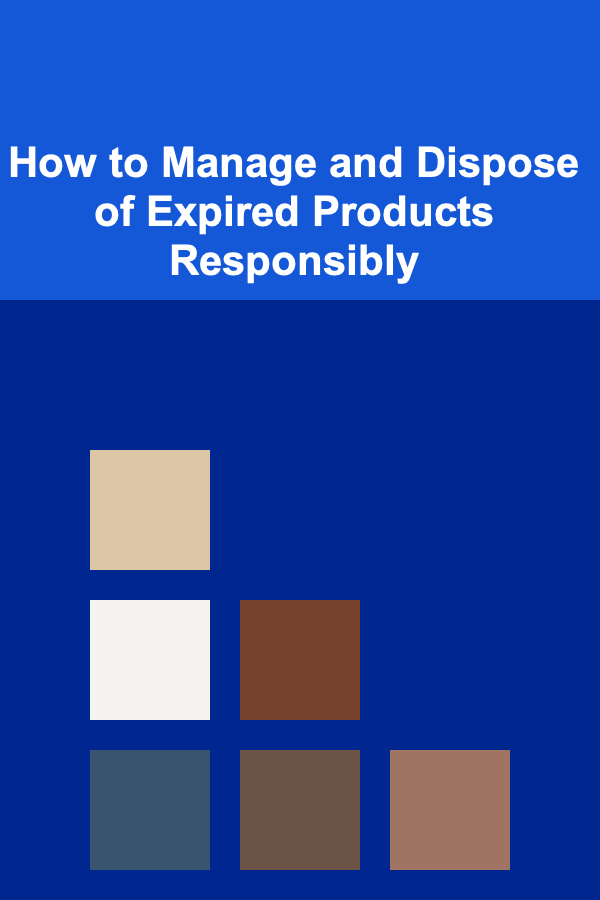
How to Manage and Dispose of Expired Products Responsibly
ebook include PDF & Audio bundle (Micro Guide)
$12.99$5.99
Limited Time Offer! Order within the next:

In a world where consumerism often leads to overconsumption, managing expired products in our households has become an increasingly important issue. Whether it's food, medications, cosmetics, or household items, knowing how to handle these expired products responsibly is crucial for personal health, environmental sustainability, and community safety. This comprehensive guide will delve deeply into the various aspects of managing and disposing of expired products responsibly, offering practical strategies and insights to help you navigate this essential task.
Understanding Expiration Dates
1.1 Types of Expiration Dates
Expiration dates can vary significantly based on the type of product. Here are some common terms you may encounter:
- Expiration Date: The date after which a product should not be consumed or used.
- Best Before Date: Indicates when a product is likely to be at its best quality. It may still be safe to consume afterward.
- Use By Date: More stringent than "best before," indicating the last day a product should be used for safety reasons.
- Sell By Date: Primarily a guideline for retailers to manage inventory; consumers should use products by their "use by" or "expiration" dates.
1.2 Importance of Understanding Expiry Dates
Understanding expiration dates helps prevent health issues that can arise from consuming or using expired products. Additionally, it reduces waste by promoting mindful purchasing and consumption behaviors.
Identifying Expired Products
The first step in managing expired products is identifying them effectively.
Visual Inspection
Regularly inspect your pantry, bathroom cabinets, and storage areas for products approaching or past their expiration dates. Look for:
- Discoloration
- Unusual smells
- Changes in texture
Referencing Labels
Familiarize yourself with each product's labeling system. Many products will have their expiration or best-before dates printed clearly, generally located on the packaging.
Managing Expired Products
3.1 Categorizing Products
To simplify the process of managing expired products, categorize them:
- Food Products
- Medications
- Cosmetics and Personal Care Items
- Household Items
By organizing items into categories, you can efficiently address management and disposal methods suited to each type.
3.2 Regular Inventory Checks
Schedule regular checks---ideally every month or seasonally---to ensure all products are accounted for and appropriately managed. During these checks:
- Create a Checklist: Keep track of what you have, noting expiration dates.
- Set Reminders: Use calendar alerts to prompt periodic inspections.
Safe Disposal Methods
Knowing how to dispose of different types of expired products safely is vital for both health and the environment.
4.1 Food Products
When dealing with expired food:
- Composting: If food is organic and hasn't spoiled, consider composting it.
- Trash: For non-compostable items, seal them in a bag and dispose of them in the trash.
- Local Regulations: Some municipalities have specific guidelines for disposing of food waste; check local rules.
4.2 Medications
Improper disposal of medications can lead to environmental contamination and accidental ingestion. Follow these steps:
-
Medication Take-Back Programs: Many pharmacies and local health departments offer programs for safe medication disposal.
-
Disposal in Household Trash: If no take-back program is available:
- Mix medications (do not crush tablets) with an unpalatable substance (e.g., dirt, cat litter).
- Place the mixture in a sealed plastic bag or container.
- Dispose of it in your household trash.
-
Flushing: Only flush specific medications if the label or patient information specifically instructs it, as most drugs can contaminate water sources.
4.3 Cosmetics and Personal Care Products
Expired cosmetics can harbor harmful bacteria and should be disposed of properly:
- Trash Disposal: Most cosmetics cannot be recycled due to contamination risks. Seal them in bags and throw them in the trash.
- Check Local Guidelines: Some areas may have specific disposal instructions for beauty products.
4.4 Household Items
For household items like cleaning supplies and batteries:
- Hazardous Waste Facilities: Many cleaning products contain chemicals that could be harmful to the environment. Always check with local waste management for hazardous waste drop-off locations.
- Battery Recycling: Many retailers offer battery recycling services.
Recycling and Upcycling Options
Not everything needs to go straight to the landfill. Consider recycling or upcycling options for your expired products.
Food Containers
Clean food containers can be repurposed for storage around the house, such as organizing office supplies or craft materials.
Glass Jars
Old glass jars can serve as decorative storage solutions, vases, or even candle holders.
Plastic Bottles
Plastic bottles can be transformed into planters, bird feeders, or other DIY projects.
Cosmetic Containers
Empty cosmetic containers can be refilled or repurposed for travel-sized products.
Community Resources
Many communities offer resources aimed at responsible disposal:
- Local Hazardous Waste Collection Events: These events allow residents to drop off items that require special handling.
- Take-Back Programs: Some prescription drug plans or pharmacies have initiatives for returning unused medications.
- Non-Profit Organizations: Certain organizations accept donations of unused or unopened products.
Creating a Responsible Disposal Plan
A responsible disposal plan ensures that you regularly manage and dispose of expired products effectively.
Step-by-Step Plan
- Inventory Check: Schedule monthly checks of your products.
- Categorization: Assign categories and designate disposal methods for each.
- Develop a Timeline: Create a timeline for inspecting and disposing of items.
- Community Engagement: Stay informed about community resources and recycling programs.
Communicate with Family Members
Involve everyone in your household by explaining the importance of managing expired products and sharing the disposal plan.
The Environmental Impact of Improper Disposal
Improper disposal of expired products can lead to significant environmental issues, including:
- Water Contamination: Medications disposed of improperly can leach into water supplies, harming aquatic life and public health.
- Landfill Overflow: Food waste in landfills generates methane, a potent greenhouse gas.
- Chemical Leaching: Cleaning products and cosmetics can release harmful chemicals into the soil and groundwater.
Benefits of Responsible Management and Disposal
Responsible management and disposal of expired products offer numerous benefits:
- Health Safety: Reduces the risk of health hazards associated with expired or spoiled items.
- Environmental Protection: Helps minimize pollution and conserve resources.
- Financial Savings: Encourages better purchasing habits and reduces wasted money on products that go unused.
- Community Wellbeing: Supports public health initiatives and promotes a cleaner environment.
Conclusion
Managing and disposing of expired products responsibly is more than just a household chore; it reflects a commitment to personal health, environmental stewardship, and community wellbeing. By understanding expiration dates, implementing effective management practices, and utilizing safe disposal methods, you can make a positive impact. Through conscious decisions and proactive habits, you contribute to a healthier home and planet. Start today, and inspire others to join you in this essential effort!

How to Create a Fun Experience for Kids at Your Yard Sale
Read More
How to Save on Heating and Cooling Costs at Home
Read More
How to Create Engaging YouTube Videos
Read More
Optimizing Augmented Reality (AR) for Low-Light Environments
Read More
How to Save Money on Car Ownership as a City Dweller
Read More
How to Prepare for the Civil Engineering FE Exam
Read MoreOther Products

How to Create a Fun Experience for Kids at Your Yard Sale
Read More
How to Save on Heating and Cooling Costs at Home
Read More
How to Create Engaging YouTube Videos
Read More
Optimizing Augmented Reality (AR) for Low-Light Environments
Read More
How to Save Money on Car Ownership as a City Dweller
Read More